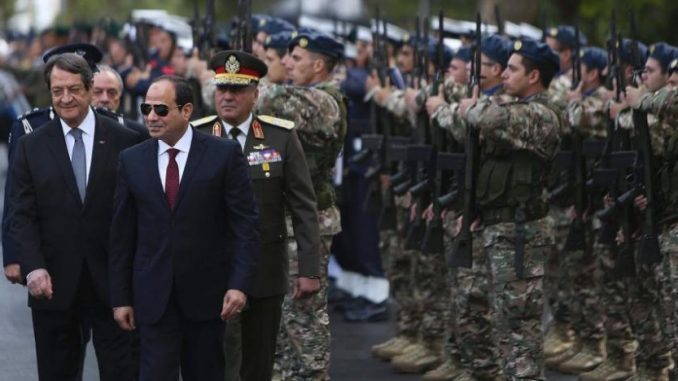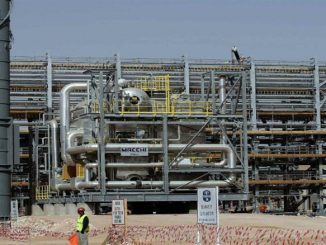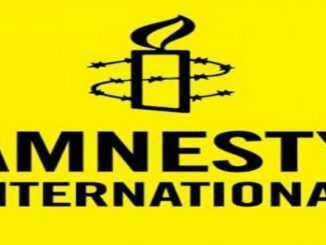
Two days ago, Abdel Fatah al-Sisi visited Cyprus, met with Cypriot President Nicos Anastasiades and held separate meetings with the state’s senior officials, including the Parliament President Demetris Syllouris.
In a press conference, Al-Sisi thanked Anastasiades for his country’s previous stances that have always been supportive of Egypt.
Al-Sisi described the relations between Egypt and Cyprus as strong and historical. He said,” Thank you for all of your previous stances that have been supportive of us, and we are looking to enhance and develop our mutual relations, especially in the economic and cultural fields.”
From his side, Anastasiades described Sisi as “his friend,” adding that he is looking to boost the two countries’ relations and cooperation.
During the visit, al-Sisi and Anastasiades signed a number of cooperation agreements. Moreover, the foreign ministers of both countries signed a number of agreements in various fields, including memoranda of understanding in health affairs, security issues and communications.
Addressing the Cypriot parliament, al-Sisi said”I hoped to address all of you today as a complete parliament; however, I’m feeling sorry for the members who decided to boycott parliament sessions since 1963,” Sisi said in his speech. He added that he is sure that all of Cyprus’s efforts to resolve its situation will end successfully. Moreover, he affirmed that Egypt completely supports Cyprus’ efforts and causes. In the same context, a tripartite summit was held between Egypt, Cyprus, and Greece.
“The tripartite summit of Egypt, Cyprus, and Greece is the launching pad of a stronger political, economic and strategic alliance,” professor of political science at the American University in Cairo Tarek Fahmy said in a press remark. Fahmy further explained that this strong alliance between the three countries establishes the framework of a forthcoming military and strategic alliance between them.
The first tripartite summit between Egypt, Greece, and Cyprus was held for the first time in Cairo in 2014, and then in Nicosia in April 2015. The third summit was in Athens and the fourth was in Cairo in 2016.
Economic and Tourism Agreements:
Al-Sisi and Anastasiades inaugurated the Egypt-Cyprus Business Forum, which aims to activate bilateral economic and trade relations, as well as explore mutual investment opportunities.
The two Mediterranean countries signed several memoranda of understanding in the fields of security, communications, medicine, and business.
Foreign ministers of both countries signed a number of agreements in different fields, including Memoranda of Understanding in health affairs, security issues and communications.
During the tripartite meeting, the Greek President Tsipras also referred to cooperation opportunities in transportation, tourism, energy, economy, defense, and security.
Tsipras also said that two agreements have been signed between the three countries in tourism and protecting heritage.
The Greek president also said that Greece will open an olive farm in Egypt as a symbol of friendship, as well as a center for innovation in Cairo, with future branches to open in Lebanon and Cyprus.
Energy Cooperation and Hydrocarbon Discoveries
Cooperation in the energy field came at the forefront of the summit, as the leaders declared finding new gas fields in the eastern Mediterranean. Al-Sisi said that the newly discovered gas deposits in the eastern Mediterranean can offer Europe the alternative sources of energy that it’s searching for. Moreover, he added that the Europe can take advantage of the proximity of both Egypt and Greek Cyprus to the continent in that energy search.
Al-Sisi said, “These gas discoveries can contribute to the European continent’s search for alternative energy sources, taking advantage of the position of Egypt and Cyprus”
In the same context, the Greek Cyprus President said his country will promote closer relations between Egypt and the European Union, calling Egypt an “absolutely necessary strategic partner” for the 28-member bloc on issues like energy.
“Our vision is that the discovery of hydrocarbon deposits in the wider region becomes a catalyst for wider cooperation in the eastern Mediterranean, contributing to regional peace, stability, and prosperity,” Anastasiades said.
In the last three years, Egypt and Greek Cyprus have aimed at forging closer ties as part of a relationship built largely on energy cooperation.
In addition, the three countries agreed to broaden “strategic cooperation” on energy, including how to transport newly found gas in the region to Europe and linking the electricity grids of Europe and North Africa via an undersea cable.
The 2,000-megawatt cable, known as the EuroAfrica Interconnector, will stretch nearly 1,000 miles from Greece to Egypt through Cyprus.
Interconnector CEO Nasos Ktorides said al-Sisi has given his full backing to the project so that it can be completed in 36 months.
Egyptian and Greek Cypriot officials are set to begin talks next month on a potential pipeline that could bring gas from a Cypriot offshore field to Egypt for possible domestic use or export.
Two years ago, Italian energy company Eni discovered in Egyptian waters the biggest gas field ever found in the Mediterranean. Eni, along with France’s Total and ExxonMobil are also searching for more hydrocarbons in adjacent Cypriot waters.
It is worth to mention that Greek Cyprus, Greece and Israel have also held a number of three-way talks aimed at enhancing energy and security ties.
Security Issues and Illegal migration
Security issues in the region, as well as illegal migration, was issued throughout Al-Sisi’s visit. Al-Sisi said he and Anastasiades agreed on ways of countering the threat of extremism in the region, noting a 2015 military cooperation agreement between the two countries.
Al-Sisi, who talked about the tensions in the Middle East region, said:”We are witnessing unstable conditions due to terrorism and illegal immigration; however, we are held responsible before our nations to provide them with security and peace.”
The three leaders have agreed to hold joint drills to deal with potential acts of terror. “The International community must expand and intensify its actions through a strengthened, swift and credible exchange of information as well as the disruption of sources of financing and arming of terror groups,” said Tsipras.
In addition, Al-Sisi said Egypt, Cyprus, and Greece are “conscientious” in their efforts to restore stability in the volatile region and to deal with emerging crises in neighboring countries. Regarding migration, the tripartite meeting tackled illegal migration across the eastern Mediterranean and hone their anti-terrorism tactics.
The three countries sought to get the EU more actively engaged in efforts to get a grip on migration, much of which stems from war-torn Syria and Libya.
“The problem isn’t confined to countries in the region, but is expanding and is threatening the European Union’s cohesion,” Cypriot President Nicos Anastasiades said.
Is Al-Sisi Putting Pressure on Turkey?
Some media outlets in Egypt highlighted Al-Sisi’s visit to Cyprus in the light of the Egyptian cold relation with Turkey since the military coup in 2013.
The Egyptian Turkish relations strained since the Egyptian military led a bloody coup against Egypt’s first democratically elected President Mohamed Morsi. Turkey didn’t recognize Egypt’s military regime and thus,al-Sisi’s legitimacy.
Saeed Sadek, a professor of political sociology at the American University in Cairo, said: “Given the long-standing anonymity between Greece and Turkey, the alliance creates another form of pressure on the Turkish regime, which openly buoys up the Muslim Brotherhood and serves as a safe haven for their top leaders.”
Sadek also slid on the significance of the summit in preserving Egypt’s economic interests in regard to the gas shares, which raises the ire of turkey, especially since Turkish troops are still stationed in the northern side of the Cypriot Island amid unsettled political fuss.
Sadek also praised al-Sisi long-running attempts to settle the demarcation of the maritime boundaries since assuming the presidency in 2014.
Turkey started its seismic energy exploration in eastern Mediterranean in April in line with the government’s “National Energy and Mining Policy,” as reported by Anadolu Agency.
On September 21, Turkish Foreign Minister Mevlüt Çavuşoğlu had said that “Some fields that Greek Cyprus opens to so-called international [natural gas search] tenders intersect with our country’s eastern Mediterranean continental shelf.”
“We express on every occasion that we will by no means turn a blind eye on Greek Cypriot activities in these fields on the contrary to the legitimate rights of the Turkish Cypriots and will give the necessary response in cooperation with the Turkish Cypriot government,” said the minister.
The statement came in response to a parliamentary question by main opposition Republican People’s Party (CHP) Deputy Mevlüt Dudu.
It is worth to mention that Northern Cyprus(Turkish Cyprus) Foreign ministry has stated that it doesn’t recognize all bilateral agreements signed during Al-Sisi’s visit to Greek Cyprus.
Cyprus was divided into a Turkish Cypriot state in the north and a Greek Cypriot administration in the south after an Enosis-inspired 1974 military coup was followed by violence against the island’s Turks, and Turkey’s intervention as a guarantor power. The status of the island remains unresolved in spite of a series of discussions that resumed in May 2015.



